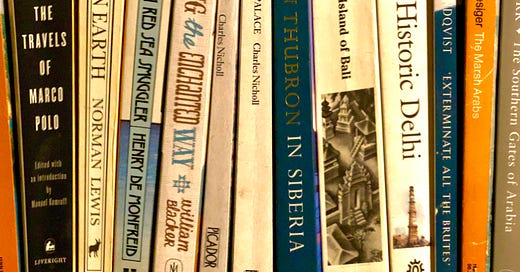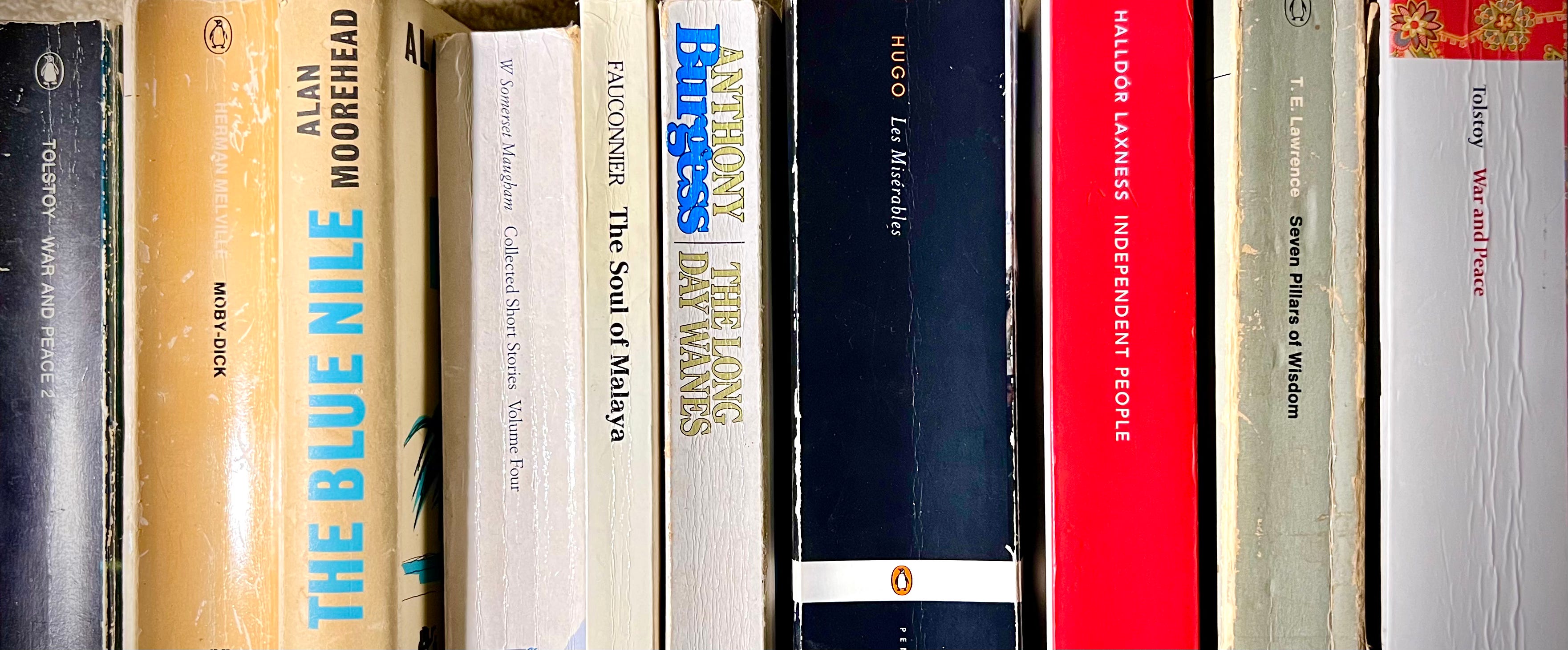2022 China Daily reports on President Xi Jinping's favourite books, the list includes Victor Hugo's Les Misérables.
2021 President Vladimir Putin is quoted as saying Tolstoy's War and Peace is his favourite book.
2016 Benjamin Netanyahu claims to be an enthusiastic reader and, on Facebook, names Aldous Huxley's Brave New World as one of his summer selections.
1990 Donald Trump is not known to be keen on books, but in an interview with Vanity Fair, his ex-wife Ivana claims that he keeps Hitler's speeches in his bedside cabinet. To be fair, this was also the year that the couple divorced.
1930s Joseph Stalin was an avid reader. The most annotated work in his library was reportedly Robert Wipper's account of the Roman Empire, but he also read works by Zinoviev, Bukharin, Kamenev and Trotsky. He was a severe critic, scrawling comments like 'rubbish', 'waffle' and 'scumbag' across the margins. Apart from Wipper, he also had them all murdered.
Many thanks to those who donated already. It takes time and effort to put Backstory together and every bit of support - comments, likes and donations - is much appreciated and encourage me to keep it rolling with stories like the following...
The first was the three-day voyage up Lake Nasser by steamer in 1982 which was immediately followed by a two-day train ride through Nubia to Khartoum and then a five-day railway epic to Wau in South Sudan. Train and boats, not planes, remind me why I love long journeys, especially those requiring many days.
During the first two legs of this marathon, I devoured Alan Moorehead's book, The White Nile, then on the last vast and eventful stage, his follow-up, The Blue Nile. The truth is that a huge factor in my travelling pleasure is the book that accompanies the trip. In fact, travelling and books are inseparable.
It is not always a happy choice. When I went to South Sudan as a schoolteacher, I packed some real doorstopping classics: Boswell's Life of Johnson, Seven Pillars of Wisdom and Moby Dick among them. What was I thinking? None were finished. But nor were they abandoned. I've got a thing about holding on to books. Like the narrator in Somerset Maugham's short story The Book Bag, I drag volumes around the world long after the prospect of opening them has faded. When I lived in Penang, Malaysia, I'd go to the E&O Hotel and perch in the corner of the bar where Maugham used to hold court and wonder if I'd ever get out of teaching and into professional writing. The barman claimed that Maugham wrote The Book Bag right there in his favourite corner, but I doubt that was true. Maugham was one of those disciplined individuals who would bang out 500 words at his desk, then retire to the bar. In the story, a random book from the bag gets loaned to a host at a remote club in Malaya and triggers a disturbing confession.
"I fly to my book as the opium-smoker to his pipe." The narrator in The Book Bag by Somerset Maugham
I was not a big Maugham fan. He seemed so remote, privileged and colonial. On the Malaysian overnight train between Johor Bahru and Kota Bharu, rattling slowly through deep dark jungle-covered mountains, I preferred to lose myself in The Soul of Malaya by Henri Fauconnier, a man who wrote like an angel. Once that was done I moved quickly on to The Malay Trilogy by Anthony Burgess, a curmudgeon who wrote like the devil. And as we all know, the devil has the best tunes.
Boats, I reckon, are the best for reading. I once hammered my way through the first three Harry Potter novels on the Newcastle to Bergen ferry. On the return journey, somewhere near Stavanger, I was sitting in the lounge deeply absorbed in the final chapters of Chamber of Secrets when I noticed that there was no one around. Doors were banging and the ship bucking like an unbroken mustang. Outside, a great shower of meteorites fell into the sea, then suddenly shot back heavenwards. It was actually the lights of rescue ships attending a ferry that had run aground in the storm. I tried to move along the corridor, but the floor was so slippery with seawater and vomit that I didn't dare attempt the stairs. I retreated to a soft bench and lay down, forcing myself back into Potterworld, blanking out the chaos. By the time we reached Newcastle, I'd finished The Prisoner of Azkaban. Later I heard that twenty people had drowned on that other ferry, the Sleipner. I've never bothered with the next four Potter instalments and don't think I ever will.
"When in doubt, go to the library"
Ron Weasley in Harry Potter and The Chamber of Secrets
Once upon a time, you would see many other passengers reading books, now there are far fewer. Coming down the Amazon last year, from Iquitos to Belem by riverboats, I never saw anyone else with a book. My companion was Independent People by Halldór Laxness. Leaving Europe I had doubted that the story of a fiercely self-sufficient Icelandic farmer at the time of the First World War was going to be appropriate, not for 3,000 km of jungle. Somehow, however, it worked. I met jungle pioneers who built their own houses, grew all their own food, and had struggled to survive, as had Laxness's anti-hero Bjartur. Like a cube of ice dropped in a glass of cachaça, the book improved the mix; the brutal tale of frontier life in the frozen north melding seamlessly into my Amazonian experience.
The previous year I cycled through Denmark then caught the ferry to the Faroes, carrying the first part of a two-volume edition of War and Peace. I had thought 600 pages plenty, but by the time I reached the Faroese capital, Tórshavn, I was eeking it out, knowing I was going to miss the Battle of Borodino. But there, in the turf-roofed Jacobsen's bookshop, was a full English-language edition. It was like being thrown a lifeline. With a Tolstoyan wind in my sails, it was easier to see the heroic in ordinary lives: the two women who occupied their grandparents house and had never changed a thing, the man who lived in a cabin built of driftwood, and even the ferry deckhand whose passion was whaling. I finished the book as we pulled back into Hirtshals, Denmark, two weeks later.
Now I'm on a boat in Norway for a week and I've got Victor Hugo's Les Misérables to dive into, between sightings of the aurora and sea eagles. In that massive, looping, digressionary masterpiece, the author is describing Combeferre, one of the group of friends that form the revolutionary ABC society and haunt the Café Musain.
"He shared every dream for the future - the development of railways, the elimination of suffering by surgery, the fixing of pictures in a darkroom, the electric telegraph, the guided balloon. For the rest, he was undismayed by the barriers to human progress erected by superstition, despotism, and prejudice, being among those who believe that knowledge must always prevail in the end."
And I look across the bar, seeing everyone stooped over their phones, and I start wondering: does anyone still believe that technological progress will vanquish superstition, despotism and ignorance?
Naturally, I google it, discovering that many of the ignorant despots and proto-dictators seem to like reading books, some even choose the same ones as me. This is quite a dispiriting discovery and reminds me of something that happened in the summer of 2016.
I had gone to the most remote island in Croatia, a beautiful craggy location called Lastovo where I stayed in a lighthouse. One day I noticed the menacing outline of a strange boat out at sea. It was entirely grey and featureless. Next morning I went kayaking and a jet-ski came sweeping past, ridden by a mean-looking hoodlum wearing shades. That evening three super yachts appeared and anchored out in the bay. Through binoculars I could just make out people in swimsuits lounging on the decks. A local official told me that a group of billionaires had hired the entire marine area from the Croatian government and no one, not even local fishermen who needed their daily catch, were allowed inside the protection zone. The yachts, he claimed, belonged to Wendi Deng (Rupert Murdoch's ex-wife), Dasha Zhukova (Roman Abramovich's third wife) and Ivanka Trump (Donald's daughter).
Now, sitting on a Norwegian ship somewhere inside the Arctic Circle, I become one of the doomscrollers. I find photographs online that confirm what that local man had told me: pictures of Wendi Deng and Ivanka Trump in the area, lounging on deck, checking their phones, but also holding books. Was Dasha there too? I dive into another whirlpool and find reports that Dasha had introduced Wendi to her latest dating partner, a well-known Russian politician called Vladimir Putin. Nothing is certain, of course, but I can still see that sinister FSB-style boat, slinking its way around the bay, checking every corner. Perhaps Putin had been there too, lying on deck in a pair of Soviet-era trunks next to Wendi in her Missoni bikini.
I wonder what they were reading.
"Nothing is more pointless than to win, the real triumph is to win over." Les Misérables by Victor Hugo.







I answered a classified ad from Project Trust for a year's international volunteering. 6 months later I was on a 3 and a half day train ride from Khartoum to Nyala in 1980 as an 18 year old on my way to Zalingei in Darfur. We were stuck in Kosti for 8 hours and a new friend Mergani Mohamed Ahmed Hassan took me to the market to buy bananas and he bought some ice. We heard a whistle which was the train about to leave! We had to run back and got to the tracks as the train was slowly leaving. I run to jump on the steps and slammed my shoulder against the train while Mergani cooly turned round and calmly walked up the steps. The door was locked so we had to sit on the steps till the next station and of course that was when a dust storm hit. 30 minutes later I got back to my first class compartment where the three other 18 year old assistant English teachers heading for Darfur thought i'd been left in Kosti with no passport and the next train a week away!
Alan Moorhead's Blue Nile and White Nile were great companions.
Thank you for bringing back those memories!